1. Early life and education
Dmitry Peskov's early life was shaped by his family background and his academic pursuits, which provided a foundation for his subsequent career in diplomacy and public service.
1.1. Birth and childhood
Peskov was born in Moscow on 17 October 1967. His father, Sergey Peskov, was a prominent Soviet and later Russian diplomat who headed the Soviet diplomatic mission in Pakistan and worked in various Arab countries, including Egypt, Libya, and the United Arab Emirates. Due to his father's international postings, Dmitry frequently changed schools, alternating between domestic and international educational environments.
1.2. Education
In 1983, Peskov graduated from a specialized school in Moscow. He continued his academic journey at the Moscow State University, graduating in 1989 from its Institute of Asian and African Countries. He specialized in History and Eastern studies, which included a focus on Turkology.
1.3. Early career development
In the same year of his graduation, 1989, Peskov joined the Soviet Foreign Ministry, marking the beginning of his professional life in public service.
2. Diplomatic and political career
Peskov's career progressed from diplomatic service to a prominent role as the primary spokesperson for the Russian government, closely associated with President Vladimir Putin.
2.1. Diplomatic career
In 1990, Peskov was appointed as an administrative assistant at the Soviet embassy in Ankara, Turkey. Following this, he served in various capacities at the embassy, including attaché and then third secretary. In 1994, he was assigned to work at the Russian Foreign Ministry in Moscow. After two years in Moscow, he was posted back to Ankara in 1996, where he held the diplomatic ranks of second and then first secretary at the Russian embassy until 2000. During his time as a diplomat, Peskov became fluent in English, Turkish, and Arabic. In 1999, he served as the Turkish interpreter for then-Russian President Boris Yeltsin at the OSCE summit in Istanbul, a role that reportedly impressed Yeltsin and led to Peskov's television appearances alongside the President throughout the summit.
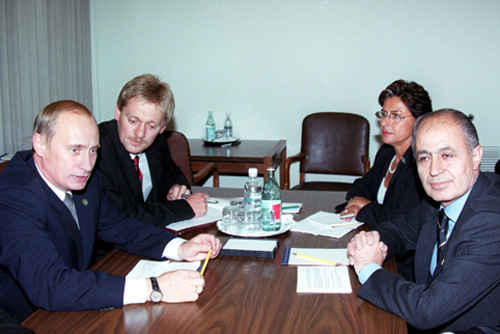
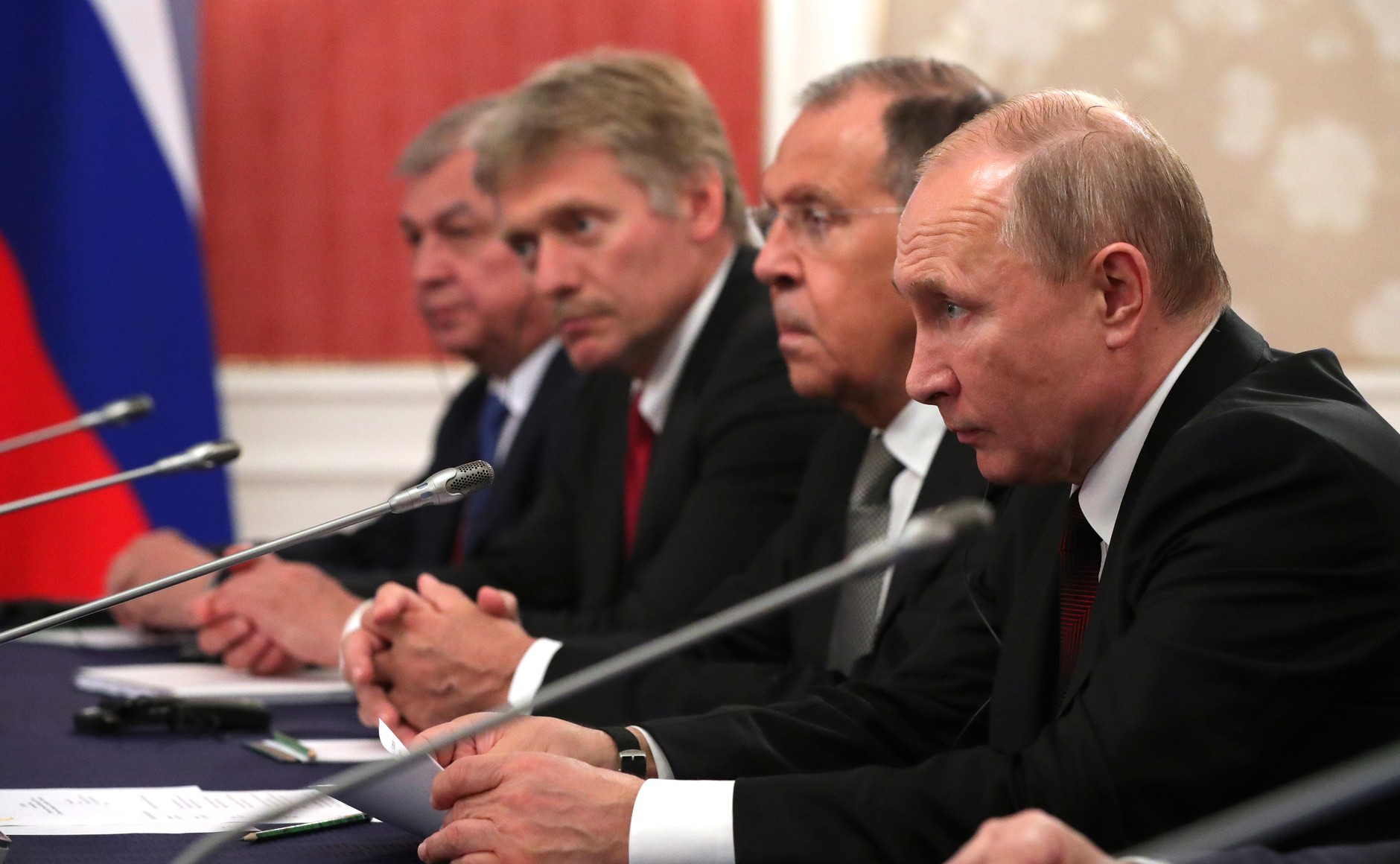
2.2. Role as Presidential Press Secretary
In 2000, following Vladimir Putin's ascension to the presidency, Peskov returned to Russia to work in the press service of the Russian President. He served in several key positions within the Kremlin's communication department. From 2004 to 2008, he held a four-year term as the first deputy press secretary to the Russian president, under Alexei Gromov, a role that granted him the authority to articulate the head of state's position on specific issues.
On 25 April 2008, Peskov was appointed as the press secretary for Prime Minister Viktor Zubkov. This appointment strategically positioned him to lead Vladimir Putin's press operations when Putin transitioned to the role of Prime Minister under Dmitry Medvedev's presidency. In May 2012, when Putin again assumed the presidency, Peskov succeeded Natalya Timakova as the presidential spokesperson, a position he has held since.
During the 2011-2013 Russian protests, Peskov made a controversial statement, asserting that "protesters who hurt riot police should have their livers smeared on the asphalt," which provoked strong criticism from opposition activists. In January 2016, Michael Cohen, then personal lawyer to Donald Trump, sent an email to Dmitry Peskov seeking assistance with a business deal in Moscow. This outreach was described by The Washington Post as the "most direct outreach documented by a top Trump aide to a similarly senior member of Putin's government." After initial difficulties, Peskov's office eventually replied via email and telephone. Cohen initially denied receiving a response when testifying to Congress but later admitted he had lied, confirming that the Moscow project continued until at least June 2016. Peskov holds the federal state civilian service rank of 1st class Active State Councillor of the Russian Federation.
3. Russian invasion of Ukraine
Dmitry Peskov has played a central role in shaping and communicating the Kremlin's narrative regarding the full-scale invasion of Ukraine, frequently making public statements, denials, and justifications that have drawn international scrutiny.
3.1. Prelude and initial statements
In November 2021, Peskov denied allegations that Russia was preparing for a possible invasion of Ukraine. In January 2022, as tensions escalated, he accused the United States of "fomenting tensions" around Ukraine.
3.2. Statements on military operations and civilian impact
On 1 March 2022, Peskov declined to comment on Russian military casualties and insisted that "the Russian troops don't conduct any strikes against civilian infrastructure and residential areas," despite mounting evidence to the contrary. On 27 March 2022, during an interview with Ryan Chilcote on PBS NewsHour, Peskov reiterated his claim that the Russian military invading Ukraine was not targeting civilians or civilian infrastructure, but only military infrastructure. He controversially suggested that Ukrainian cities like Mariupol were destroyed by Ukrainians themselves, and that murdered civilians in that city were killed by fellow "Nazi" Ukrainians. Chilcote, however, noted that "everyone outside of Russia has been watching hundreds and hundreds of hours of footage that has come out of the country showing widespread targeting of civilian infrastructure, apartment buildings, theaters, hospitals." In the same interview, regarding the use of nuclear weapons, Peskov stated that "any outcome of the operation, of course, is not a reason for usage of a nuclear weapon. We have a security concept that very clearly states that only when there is a threat for existence of the state in our country, we can use and we will actually use nuclear weapons... Existence of the state, and special military operation in Ukraine, they have nothing to do with each other." He added that a part of Putin's statement warned other states not to interfere, implying understanding of its meaning, and concluded that "No one is thinking about using, even about the idea of using nuclear weapons."
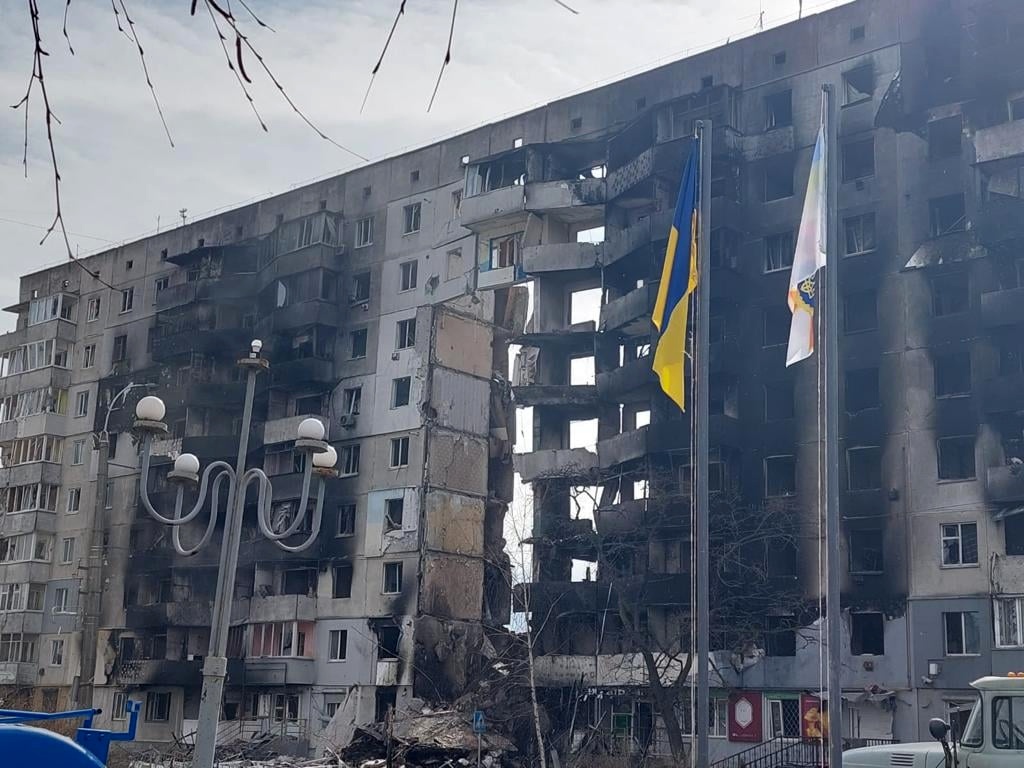
In November 2022, Peskov again denied that the Russian military was attacking civilian infrastructure in Ukraine, asserting that the Russian army only attacks targets directly or indirectly connected to military potential. In May 2023, speaking to Bosnian ATV TV channel, Peskov claimed that Russia was unable to defeat Ukraine more quickly due to Russia's "humanitarian concern for the preservation of Ukrainian cities" and "human lives." He stated that the Russian military was "so slow" in winning because "We are not waging a war... We seek to preserve the infrastructure; we seek to preserve human lives." This claim was fact-checked by Polygraph.info as false. In March 2023, despite the Russian Ministry of Defence confirming responsibility for the Dnipro residential building airstrike that killed over 40 civilians, Peskov stated that Russian forces never attack residential buildings and that the residential building had probably collapsed due to a Ukrainian air defense counterattack.
3.3. Stance on protests and opposition
Peskov has consistently taken a hard line against domestic opposition to the conflict. In March 2022, he denounced Russians who oppose the war as "traitors." On 21 September 2022, following Putin's announcement of a partial military mobilization, Peskov declined to deny reports that some anti-war protesters had been given draft papers, noting that the delivery of subpoenas to detainees does not contradict the law. In March 2023, Peskov defended the conviction of single father Alexei Moskalyov, who was sentenced to two years in prison under Russia's 2022 war censorship laws for anti-war comments on social media, calling the father's parenting "deplorable." According to OVD-Info, at least 900 individuals have been convicted since the conflict began for opposing the conflict.
3.4. Specific controversies and denials
Peskov has been involved in several specific controversies and has issued numerous denials regarding alleged Russian actions in Ukraine. In early April 2022, he denied that Russian soldiers were responsible for the Bucha massacre, dismissing the entire situation in Bucha as a "well-staged insinuation." On 26 October 2022, Peskov claimed, without providing evidence, that Ukraine was planning a terrorist sabotage act using a "dirty bomb"-an explosive containing radioactive waste material. In December 2024, Peskov rejected Donald Trump's claim that Russia suffered more than 600,000 casualties in the war with Ukraine, asserting that "Ukraine's losses are multiple times higher than those of Russia."
3.5. International relations and sanctions positions
Peskov has frequently commented on international diplomatic efforts, sanctions, and relations concerning the conflict. On 2 August 2022, he stated that Nancy Pelosi's visit to Taiwan was leading to an "increase in tension" in the region and accused the United States of choosing "the path of confrontation," adding, "We want to emphasise once again that we are absolutely in solidarity with China, its attitude towards the problem is understandable and absolutely justified." In late December 2022, he asserted that any peace plan to end the Russo-Ukrainian War could only proceed from Ukraine's recognition of Russia's sovereignty over the regions it illegally annexed from Ukraine in September 2022. He also stated that due to the resistance of the Ukrainian army and Western military support to Ukraine, "the suffering of the Ukrainian people will continue longer than it could have."
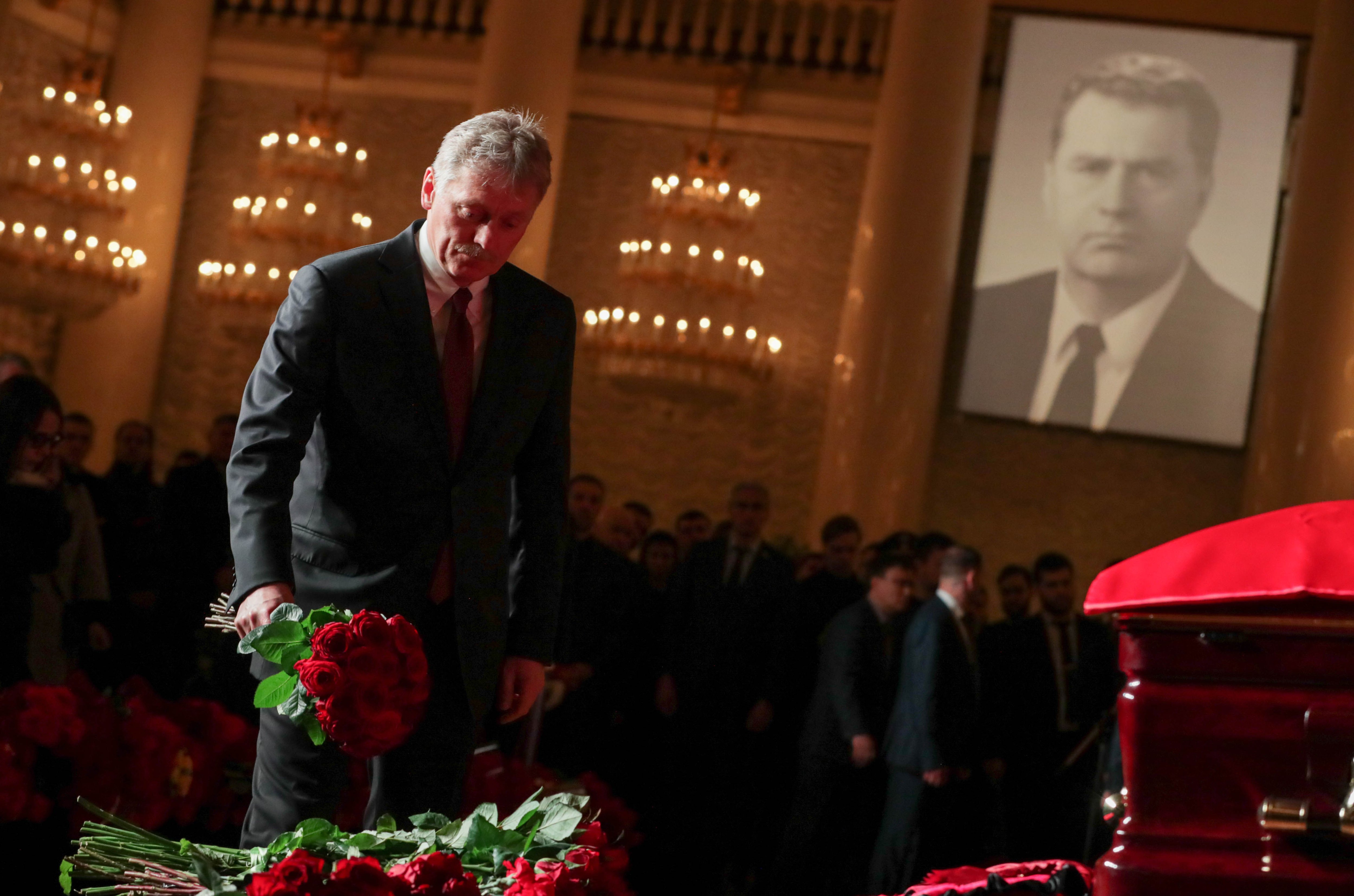
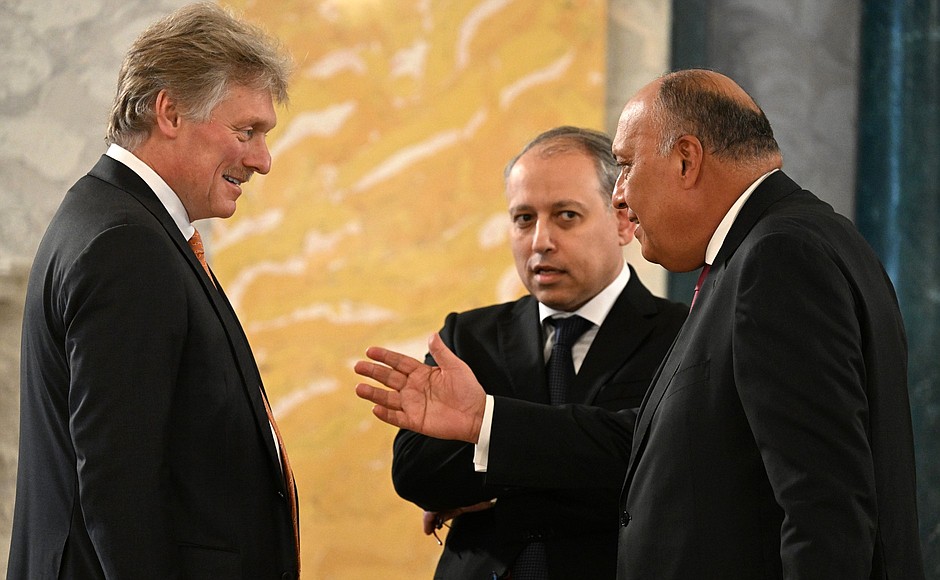
In January 2023, Peskov stated that "there is currently no prospect for diplomatic means of settling the situation around Ukraine." In March 2023, following the submission of the Chinese peace proposal, he acknowledged that "we paid a lot attention to our Chinese friends' plan," but emphasized that new "territorial realities could not be ignored" as these realities became "an internal factor" for Russia. He then rejected the Chinese peace proposal, stating that "for now, we don't see any of the conditions that are needed to bring this whole story towards peace." On 14 March 2023, Peskov commented on possible peace talks between Russia and Ukraine, saying: "We have to achieve our goals. Right now this is only possible by military means due to the current position of the Kyiv regime." He called the ICC arrest warrant for Vladimir Putin "outrageous and unacceptable," asserting that Russia does not recognize the jurisdiction of the International Criminal Court. On 4 May 2023, Peskov claimed, without evidence, that the United States was behind the alleged drone attack on the Kremlin, stating that "We know very well that decisions about such actions, about such terrorist attacks, are made not in Kyiv but in Washington."
In June 2023, when a delegation from Africa visited Ukraine and Russia to call for peace, Putin rejected their peace plan based on accepting Ukraine's internationally recognized borders. Peskov echoed this, saying that it was difficult to implement the African peace plan. In July 2024, after the United States announced its intention to deploy long-range missiles in Germany from 2026, Peskov stated that Russia was taking "steady steps towards the Cold War," aligning with Putin's warnings of a Cold War-style missile crisis. In August 2024, during the Ukrainian invasion of the Kursk Oblast, Peskov was reportedly on summer vacation and could not be reached for comment on developments in Kursk. On 22 November 2023, Peskov welcomed the ceasefire in the war between Israel and Hamas, stating that "Russia and most countries in the world have been calling for a ceasefire and for a humanitarian pause." On 22 April 2024, after the Ukraine Security Supplemental Appropriations Act, 2024 passed the US House of Representatives, Peskov remarked that the legislation authorizing the confiscation of frozen Russian reserves was "nothing less than the demolition of all the foundations of the economic system" and "an attack on state property, state assets and private property."
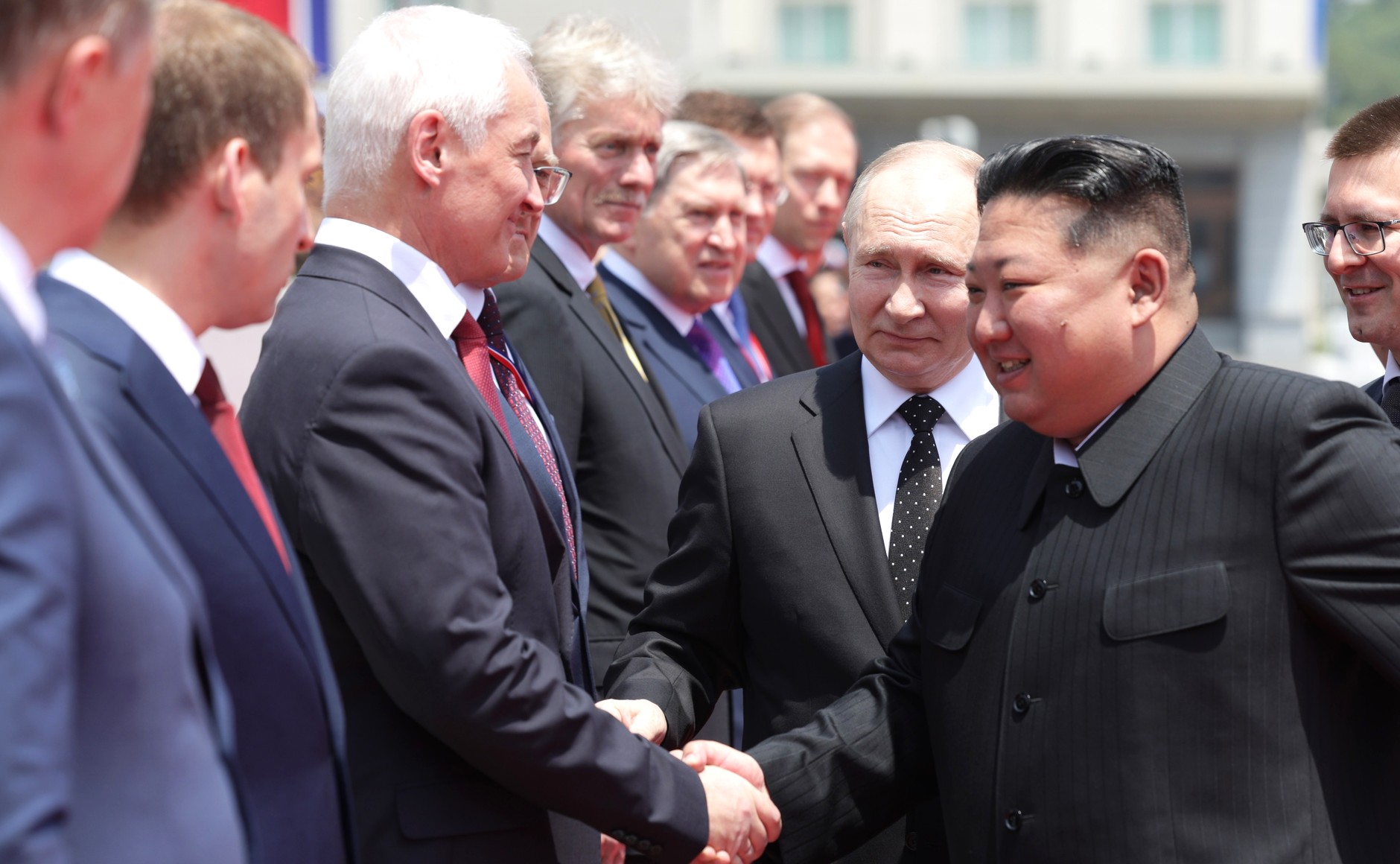
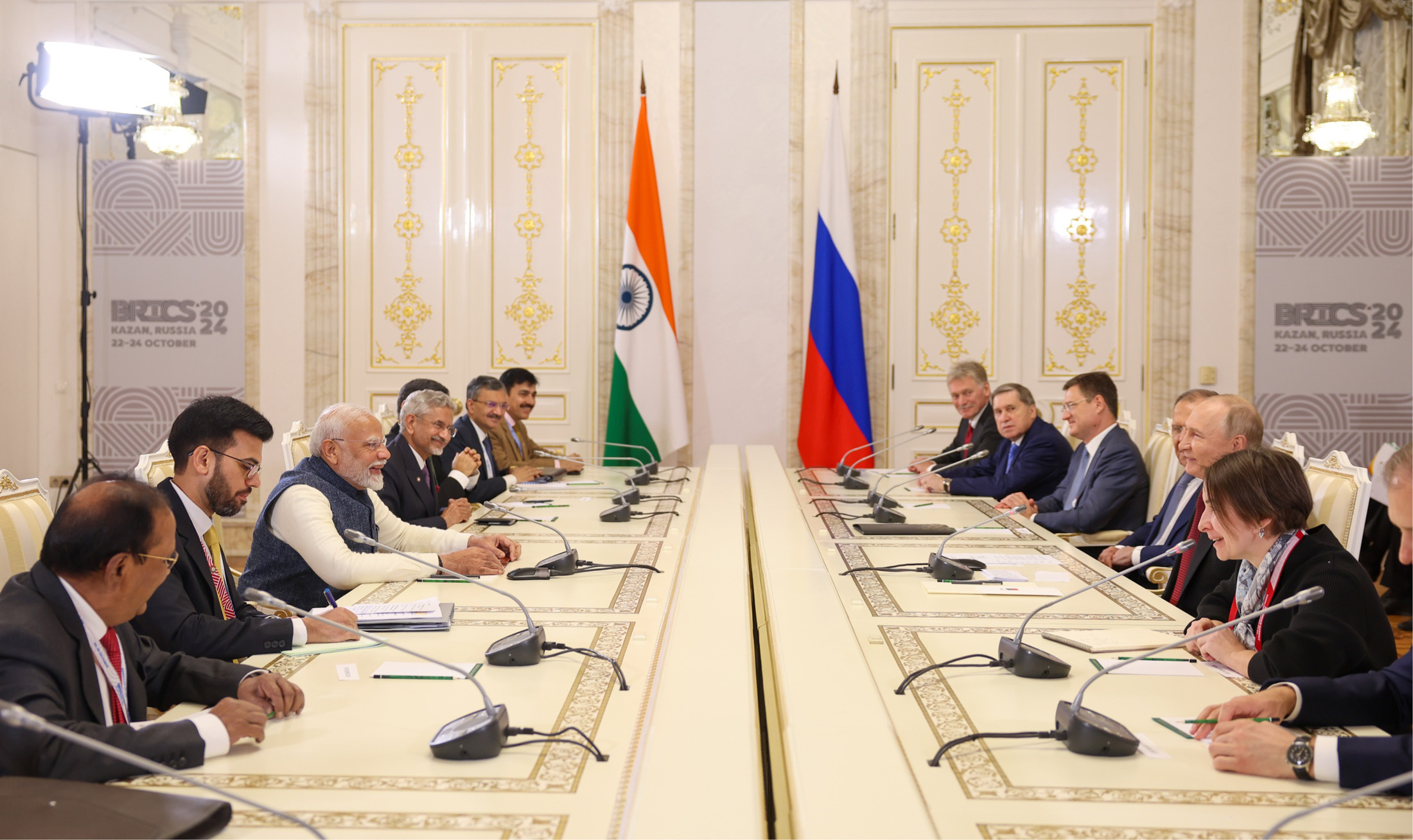
3.6. Views on the nature and goals of the "special military operation"
Peskov has consistently articulated the official Russian position on the nature and objectives of the conflict in Ukraine. In early April 2022, he stated that the war was necessary because Ukraine had been an "anti-Russian center" since 2014. In May 2023, he claimed that the goals of the "special military operation" were "partially achieved," but that the tasks "related to the protection of Donbas residents" were far from being completed. In an interview with The New York Times on 6 August 2023, Peskov stated that Russia did not seek to annex more territory in Ukraine, but rather "just want to control all the land we have now written into our constitution as ours." On 2 November 2023, Peskov asserted that the war in Ukraine was "not in a stalemate" and that Russian troops would continue to fight, stating that "all the goals that were set should be fulfilled." On 22 March 2024, Peskov publicly admitted that "De jure it is a special military operation. But de facto it has turned into a war."
In the same New York Times interview on 6 August 2023, Peskov controversially stated that "our presidential election is not really democracy, it is costly bureaucracy. Mr. Putin will be re-elected next year with more than 90 percent of the vote." He later clarified this as his personal opinion. In an interview with the RBK news agency, Peskov further commented that Russia "theoretically" does not need to hold presidential elections because "it's obvious that Putin will be reelected."
4. Personal life
Dmitry Peskov's personal life, including his multiple marriages and the public activities of his children, has often been a subject of media attention and controversy.
4.1. Marriages and children
Peskov has been married three times and has five children from these relationships. In 1988, he married Anastasia Budyonnaya, the granddaughter of Soviet military commander Semyon Budyonny. They had one son, Nikolay Peskov, born in 1990, before their divorce in 1994.
His second marriage was in 1994 to Ekaterina Solotsynskaya, the daughter of diplomat Vladimir Solotsynsky. Together, they had a daughter, Elizaveta "Liza" Peskova (born 1998), and two sons, Mika and Deni. Deni is reported to reside in Paris. This marriage concluded before August 2015.
In August 2014, Peskov had a daughter, Nadya, with Olympic Champion ice dancer Tatiana Navka. They became engaged in July 2015 and married on 1 August 2015, after Peskov finalized his divorce from his second wife. Some reports suggest their marriage occurred in June 2015. Tatiana Navka holds citizenship with both Russia and the United States. In May 2020, Peskov was admitted to hospital after testing positive for COVID-19 and was discharged on 25 May after recovering.
4.2. Family members' activities and controversies
The public activities and alleged controversies involving Peskov's children have drawn significant media scrutiny. His eldest son, Nikolay Peskov, is a former conscript in Russia's Strategic Rocket Forces. He has reportedly served in the Wagner Group, although media reports indicated his Tesla Model X was repeatedly caught violating speed limits in Moscow at the same time he was allegedly serving on the war front in Ukraine. Nikolay also gained notoriety when he told pranksters, who pretended to be recruitment officers, that he had no intention of going to war because he is "Mr. Peskov" and would solve the issue "on a different level."
His daughter, Elizaveta "Liza" Peskova, has worked as an assistant to Aymeric Chauprade, a far-right French Member of the European Parliament. Following the Russian invasion of Ukraine in February 2022, Elizaveta posted the words "no to war" to her Instagram page, which she deleted shortly afterwards. Furthermore, her company in Russia, "Centrum Moscow," saw its revenue increase 70 times for the 2022 fiscal year, with Elizaveta earning a reported 137.00 M RUB, a significant increase from the previous year.
5. Wealth and controversies
Dmitry Peskov and his family have faced considerable scrutiny regarding their personal wealth, luxury possessions, and financial dealings, particularly in light of his public service role.
5.1. Wealth and luxury item controversies
Reports have indicated that Peskov's wife, Tatiana Navka, possesses real estate holdings valued at more than 10.00 M USD. She also heads two companies that have contracts with the Russian state.
During his 2015 wedding to Tatiana Navka, Peskov was photographed wearing an exclusive Richard Mille watch, reportedly valued at 670.00 K USD. This price significantly exceeded Peskov's declared income for all his years of service as a state employee, sparking a media outcry. In response, Peskov stated that Navka had paid for the watch. Later, in August 2015, Russian anti-corruption activist Alexei Navalny alleged that Peskov had vacationed with his new wife off the coast of the Italian island of Sardinia on a yacht called the Maltese Falcon, which reportedly cost €350,000 per week. Navalny cited data from yacht-tracking websites and social media posts as partial corroboration for his claims, though he presented no direct proof that Peskov had boarded the vessel. Additionally, a company named Carina Global Assets, established in January 2014, registered in the British Virgin Islands (BVI), and beneficially owned by Navka, held assets of more than 1.00 M USD, including an apartment, before being liquidated in November 2015.
5.2. Sanctions
In response to the 2022 Russian invasion of Ukraine, Dmitry Peskov and several members of his family have been subjected to international sanctions by various countries and blocs.
- On 28 February 2022, the European Union blacklisted Peskov and froze all his assets.
- The United States imposed similar sanctions on 3 March 2022, followed by Australia on 8 March 2022.
- The United Kingdom imposed sanctions on Peskov on 15 March 2022, and again in 2023.
- The United States also specifically sanctioned his wife, Tatiana Navka, and two of his children, Nikolay Peskov and Elizaveta Peskova.
6. Awards and honours
Throughout his career, Dmitry Peskov has received several official recognitions and accolades from both Russian and foreign entities.
| Type | Award | Date |
|---|---|---|
| Russian awards |  Order of Honour | 6 August 2007 |
 Order of Friendship | 22 November 2003 | |
 Gratitude from the President of the Russian Federation | 2004, 2007 | |
 Gratitude from the Government of the Russian Federation | 2009 | |
| Foreign awards |  Commander of the Order of Merit of the Italian Republic (Italy) | 4 October 2017 |
 Order of Manas, 3rd class (Kyrgyzstan) | 16 June 2017 | |
 Order of the Polar Star (Mongolia) | 2021 |
7. Assessment and criticism
Dmitry Peskov's public role as the Kremlin's chief spokesperson has placed him at the forefront of defending Russian government policies, particularly concerning the war in Ukraine, leading to significant criticism from international media, political observers, and human rights organizations.
7.1. Criticism and controversies
Peskov has been widely criticized for his statements and denials regarding the Russian invasion of Ukraine. His repeated insistence that Russian forces do not target civilian infrastructure or residential areas, despite extensive evidence to the contrary, has been a consistent point of contention. For instance, his claims that the destruction in Mariupol and the collapse of a residential building in Dnipro were caused by Ukrainian forces or air defense, rather than Russian strikes, have been met with skepticism and condemnation. Similarly, his denial of Russian responsibility for the Bucha massacre, which he dismissed as a "well-staged insinuation," has been a major source of international outrage.
His characterization of anti-war protesters within Russia as "traitors" and his defense of the conviction of individuals like Alexei Moskalyov for anti-war comments highlight a critical perspective on his role in suppressing dissent and freedom of speech within Russia. Furthermore, his statements on the nature of the "special military operation," including his admission that it has "de facto" turned into a war, and his assertions about the goals being "partially achieved" while tasks related to "protection of Donbas residents" remain incomplete, are seen by critics as attempts to justify ongoing aggression and obfuscate the true objectives and impact of the conflict.
Controversies surrounding his personal wealth, such as the expensive watch worn at his wedding and allegations of vacationing on a luxury yacht, have fueled accusations of corruption and a disconnect between the lifestyle of Kremlin officials and the general Russian populace. The international sanctions imposed on him and his family members further underscore the global perception of his complicity in the Russian government's actions. His claims about the lack of democracy in Russian elections and the certainty of Putin's re-election also draw criticism for undermining democratic principles.